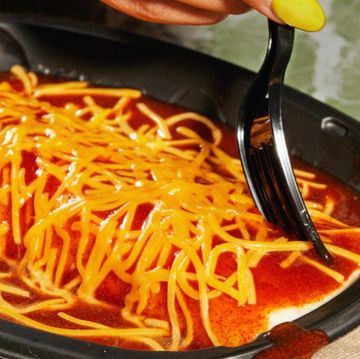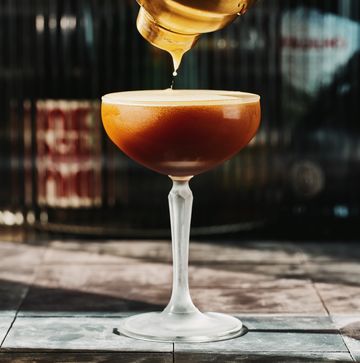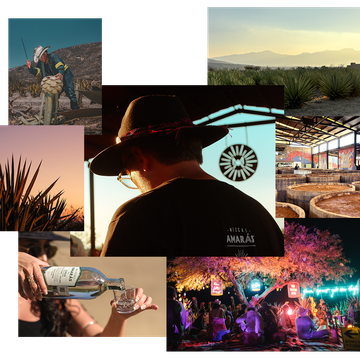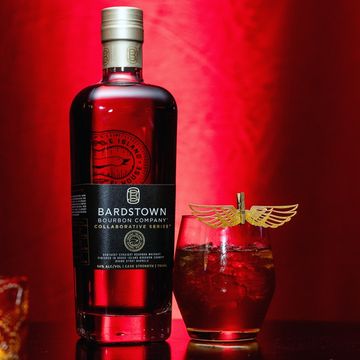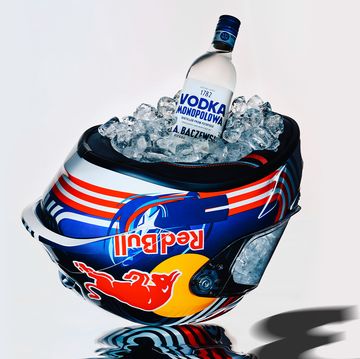In case you didn't notice, despite "aporkalyptical" fears from months past and surveys claiming its popularity is "waning," we still love bacon. The end of 2012 brought with it a premiere of The United States of Bacon, a television show following chef Todd Fisher as he eats enough to clog a drainpipe. There's no denying that our cultural obsession with bacon is still here, and it's lasted a long time, even before we had a way to meme-ify and merchandize it with Band-Aids and scratch-and-sniff stickers. Looking to food manufacturing over the past century, bacon has long proved a handy marketing tool for all manner of unrelated food — potato chips, tofu, eggplant, ad infinitum.
The key to its selling power, food historian Ken Albala explains, is its distinctly populist, American character. We don't import bacon (at least the truly American stuff we refer to as bacon), and it's unlikely you'll spend more than $15 on a package. We're hard-wired to love it, with its devastating combination of smoke, fat, and salt. And now that we understand the consequences of red meat and fatty food, eating bacon has become an act of rebellion — which makes it all the more American. That's partly why we're willing to watch Todd Fisher sweat through American kitchens, consuming six-inch-thick sandwiches and peanut-butter-and-bacon milkshakes, in spite of any current national statistics on obesity and diabetes.
But even if we love to defy reason in the name of freedom, Americans don't always like to pay the consequences. As a result, we've created a trail of bacon products that reflect trends in consumer food guilt, and not just recently, either. "Beef frye" was perhaps the first imitation. A kosher substitute invented in the 1930s, it allowed Jews to indulge in a timeless American breakfast without eating a treif meat. Mock-meat and soy products hit the markets in the 1970s, capitalizing on the upswing in vegetarianism and growing concerns about the health effects of red meat. In the early '90s, the beginning of the low-fat craze, turkey bacon joined the American mainstream, promising to deliver the bacon experience with the health benefits of lower-calorie, white meat.
Now, experimental chefs have integrated bacon into the sustainable food movement through do-it-yourself and snout-to-tail initiatives that resist mass-market production models and reduce waste by using the whole animal. This has begun to popularize other forms of bacon, such as beef bacon, cut from the cow's navel, or lamb bacon, slit from the belly up to the middle of the rib cage. In these products, chefs imitate the pork process by using almost exactly the same curing salts and smoking methods, adjusted to suit the size and composition of the animal.
While these products share some essence with pork bacon — smoke, salt, crunch mouth-melting fat — character shifts with each animal. Lamb bacon crisps much like pork but has a barnyard taste. And due to the size of a cow, the connective tissue within the navel is tougher, making for a beefy, toothsome experience. More experimental cuts stray even farther from the traditional belly. Three-time winner of the Boston Cochon 555 competition, Chef Matt Jennings of Farmstead makes a pig-ear bacon that imitates fat striations with cartilage. It has to be cooked in oil because it does not render its own fat. This generation of bacon products differs from others because it does not strive to imitate. Rather, the curing process informs a different, but true, expression of the meat. In a way, these inventions return to the primal appeal of bacon with the added bonus of cutting out the negative environmental impact of industrial farming.
But perhaps this recent trend has only enhanced our love for good, old-fashioned, pork bacon. After all, sustainability doesn't exclude the real thing, taken from healthy, well-fed pigs. That kind of bacon's been around for centuries — before we knew complacency and calories became synonymous with guilt, and when food was more about sustenance than primetime television. That kind of bacon might just be irreplaceable.
PLUS: More News and Trends on Eat Like a Man
